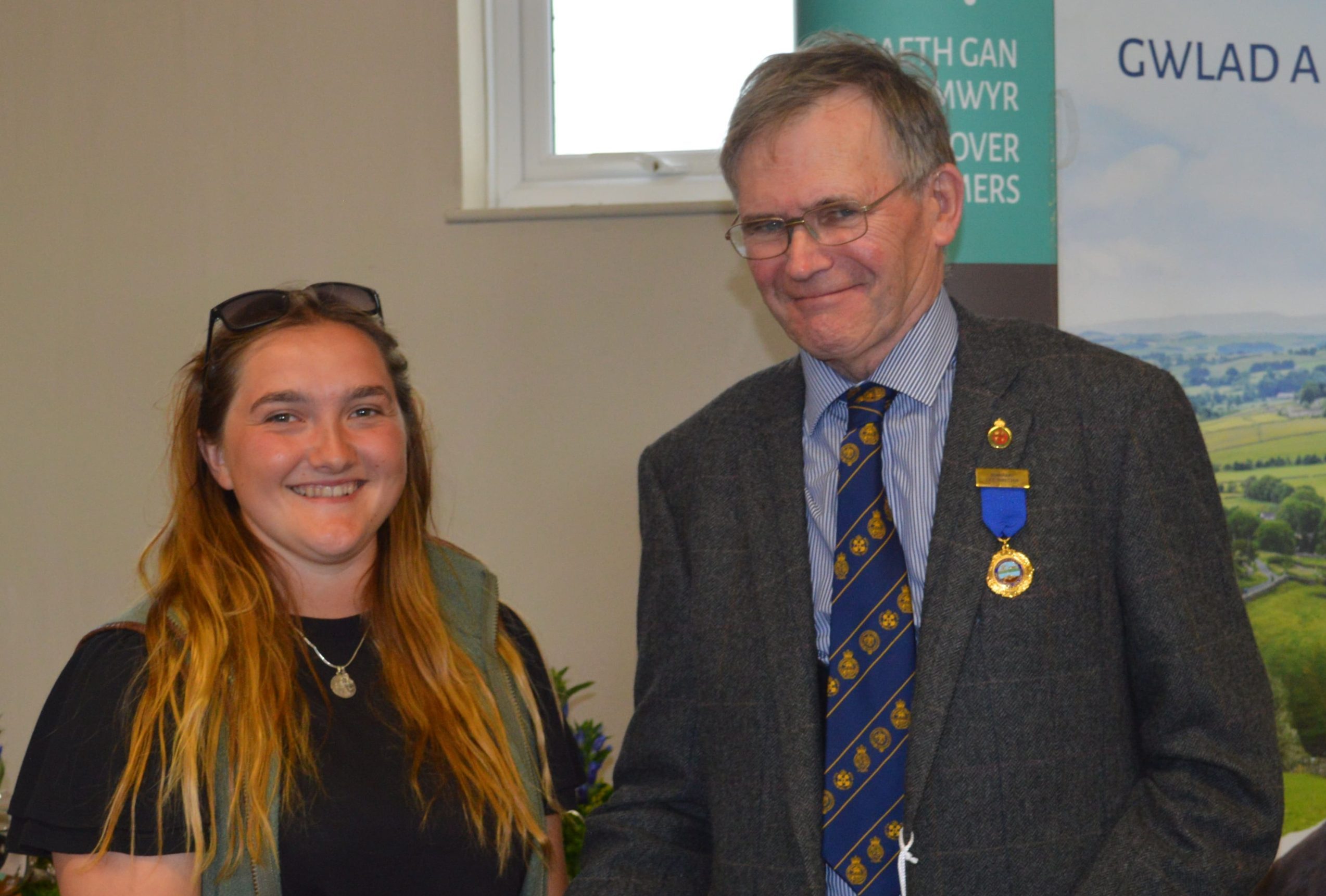Farming
Balance essential to ensure food security

HCC Chief Executive Gwyn Howells addressed a Committee of Senedd Members last week.
He delivered a stark warning about the challenges of finding the middle ground in future policy which would enable consumers to enjoy a secure source of sustainably-produced food.
The Senedd’s Economy, Trade and Rural Affairs Committee was hearing from agricultural experts on the possible impacts of the new Free Trade Agreements with Australia.
Politicians heard that the UK farming sector was concerned that the trade deals which had been struck with two of the most significant red meat exporting countries had the potential to distort the domestic market.
The UK Government’s Impact Assessment of the Australian Free Trade Agreement estimates that the value of the domestic agriculture sector could reduce by £94million, in favour of increased opportunities for manufacturing and other industries.
In his evidence, Gwyn Howells emphasised that sustainability and food security had to be taken into account.
“It may be short-sighted to be increasing food imports from across the world, which may be produced to lower standards than our food, when at the same time we’re rightly pushing for sustainability,” he said.
“It’s an anomaly that while sustainability is rightly driving future food and farming policy, there’s little discussion of food security,” said Gwyn. “It’s essential to count the carbon cost of food imported, allowing for the different production systems in other countries and the cost of transportation.”
Gwyn added, “In Wales we have one of the most sustainable red meat agriculture sectors anywhere in the world. We need to find a policy sweet spot in the middle between producing food which drives economic activity and at the same time doing it in a sustainable way.”
The evidence session also discussed likely trade flows over the coming years. Gwyn Howells said that while there were no immediate increases in import volumes from Australia, there were long-term trends that caused concern.
“Currently, production in Australia is low due to droughts, but livestock levels are forecast to rise in the coming years,” he said. “It’s true that significant exports from Australia and New Zealand are going to Asia at the moment, but that could change due to political circumstances, and there’s little future-proofing in these new trade deals for UK farmers.”
Farming
Pembrokeshire Agricultural Society in search for county’s top progressive farmers

IF you farm in Pembrokeshire and can demonstrate your farm’s use of the latest technological methods to promote progressive, sustainable agriculture then the Pembrokeshire Agricultural Society encourage you to enter the prestigious Baron de Rutzen Award.
Adam Thorne, Pembrokeshire County Show President, said, “We are looking for local Pembrokeshire farmers, under the age of 45, who can demonstrate their farm’s use of the latest technological methods to promote progressive, sustainable agriculture. They also need to show consideration for the environment and habitat sensitivity on their farm as well as present an aesthetically pleasing example of farming in the county. The competition welcomes all livestock and arable sectors to take part.”
Last year’s winners of the Award were Mark and Caroline Davies of Little Newcastle, Haverfordwest. They milk 230 pedigree Holsteins through a fully automated system. They rear their own replacements and also have a small beef enterprise. The farm is all grassland and they follow a strict reseeding and liming policy to optimise the yield from their multi-cut silage system. The couple place significant emphasis on animal health, husbandry and breeding to maximise the efficiency of their system.
Baron John Fredrick De Rutzen was President of Pembrokeshire Agricultural Society in 1936 and the Baron de Rutzen Trophy was produced in his memory. The third Baron served in the Welsh Guards and tragically died, aged 36, in 1944.
This year’s entrants must be fully practising farmers within the county of Pembrokeshire and were under the age of 45 years on 1 January 2024. Entries can either be by nomination or direct application online on the Pembrokeshire Agricultural Society website. Click here to apply: Baron de Rutzen Award | Pembrokeshire County Show | Pembs Agricultural Society (pembsshow.org)
The closing date for nominations and applications is at noon on Wednesday, 29 May 2024.
Farming
Pembrokeshire Agricultural Society elect new president

ARABLE and beef farmer, Adam Thorne, has been unanimously elected to become the new President of Pembrokeshire Agricultural Society for the year ahead. Adam is the third generation of his family to hold the position.
During the Annual General Meeting of Pembrokeshire Agricultural Society, held last week on the Pembrokeshire Showground, Mr Tim John and his wife Margaret John were also voted in as Presidents elect.
Adam Thorne has had a long association with Pembrokeshire Agricultural Society. After visiting the show as a toddler, then helping show the family’s pedigree Herefords, his uncle got him into helping him with stewarding in his early teens. From there he progressed to being a Steward with his own section, Commercial Cattle, and then also the Butcher’s Lambs section.
From stewarding, Adam became involved with committee work, starting as an Executive and then on to the former Finance and General Purposes Committee. He has been Chairman of the Estates Committee for 12 years and is now a Board member and a Trustee.
Adam said, “I am proud of my long association with Pembrokeshire Agricultural Society. I am the third generation to now be President, following my late grandfather, Walter Thorne, my father, Robert Thorne and more recently my uncle, George Thorne. I am looking forward to my year in the prestigious position.”
Away from his work with the society, Adam runs the family’s arable and beef farm in Robeston West, Milford Haven. He has been heavily involved with Tiers Cross YFC from an early age, having been Club Secretary twice and Chairman. He has also sat on Pembrokeshire County YFC Committees and the Wales YFC Rural Affairs Committee.
The 2024 Pembrokeshire Agricultural Society officeholders, announced at the AGM, include Miss Ffion Edwards who was awarded the role of Ambassador at last year’s show. Ffion, a nurse from Maenclochog, has enjoyed many years of attending the county show and believes that there are so many good elements to it. Ffion has been a member of Llysyfran YFC for 15 years and enjoys every aspect of young farmers – trying new experiences, competing and travelling to name a few. Mrs Nicola Owen was also elected as the Honorary Treasurer.
Brian Jones, the outgoing Pembrokeshire Agricultural Society President, took the opportunity to thank everyone who had helped and supported him throughout his presidency. During his year as President, Brian and his wife Helen, raised a tremendous amount of money for various charities including the Pembrokeshire Agricultural Society, RABI, Tir Dewi and the DPJ Foundation. Brian also gave his assurances that Castell Howell will continue to sponsor the Food Hall for future years.
Pembrokeshire County Show, the largest county agricultural show in Wales, will be held over two days again this summer on 14 and 15 August. Everyone is invited to attend the celebration of rural life in the county.
Pictured (left to right): Ffion Edwards the Ambassador for 2024; Adam Thorne, President; Margaret and Tim John, the Presidents Elect.
Farming
£1,000 bursary award available to Pembrokeshire agricultural students

PEMBROKESHIRE Agricultural Society’s £1,000 Bursary Award is now open for applications from students studying agriculture, veterinary science, agricultural engineering, food technology, forestry or other subjects allied to agriculture.
The Student Bursary Award 2024 is available to students, from Pembrokeshire, who are currently studying or have been accepted to start their studies. They can apply for this financial support to assist with their chosen college or career path.
Last year’s winner of the award was Lottie Wilson from Hayscastle. Lottie was studying agriculture at the University of Nottingham when she applied for the bursary. When she is at home she is a general dairy farm worker as well as a lambing hand and a calving beef herd assistant. In 2021 she was the top agriculture student at Hartpury College.
Robert James, Chairman of the Society’s Bursary Committee said, “I would urge all Pembrokeshire students who study subjects that are clearly aligned to agriculture to apply for this bursary as it won’t only assist with your studies but will also give you great experiences such as undertaking an interview which is a key employment skill. It will also assist in your future career within the agriculture industry.”
“A panel of independent judges will draw up a short list of candidates who will be interviewed and the winning candidate will be asked to give a short presentation at a future meeting of the society’s show council.
“The standard of applications has always been exceptional which gives a lot of heart that there are a lot of very talented young people in our community. We are very much looking forward to receiving applications for this year’s bursary and hearing from the younger generation.”
Qualifying students must not have won the student bursary on a previous occasion, the applicant must be studying or has been accepted to study agriculture or allied subjects at a UK college or university at A-Level or higher and the applicant’s family home must be in Pembrokeshire.
The bursary is tax free and will be awarded to the student who, in the opinion of the panel of judges, has submitted the best dissertation on how the bursary will assist them to complete their course of study.
Further details and the entry form can be found online: Student Bursary Award | Pembrokeshire County Show | Pembs Agricultural Society (pembsshow.org) or by calling the show office: 01437 764331. The closing date for applications is noon on Monday, 1 July 2024.
-

 News6 days ago
News6 days agoSearch for missing teenager Luke continues at Pembroke Dock
-

 News4 days ago
News4 days agoPolice issue update on the search for Luke, missing from Pembroke Dock
-

 News7 days ago
News7 days agoMan jailed after scarring police officer in Narberth altercation
-

 News6 days ago
News6 days agoPembrokeshire hostel manager narrowly avoids jail sentence
-

 Sport5 days ago
Sport5 days agoHerbrandston Clinch Promotion to Division One
-

 News3 days ago
News3 days ago20mph U-turn: Some roads will return to 30mph following public outcry
-

 Community3 days ago
Community3 days agoMiracle pup finds her forever home after heart-wrenching journey
-

 Crime6 days ago
Crime6 days agoPembrokeshire car salesman caught driving on cocaine























